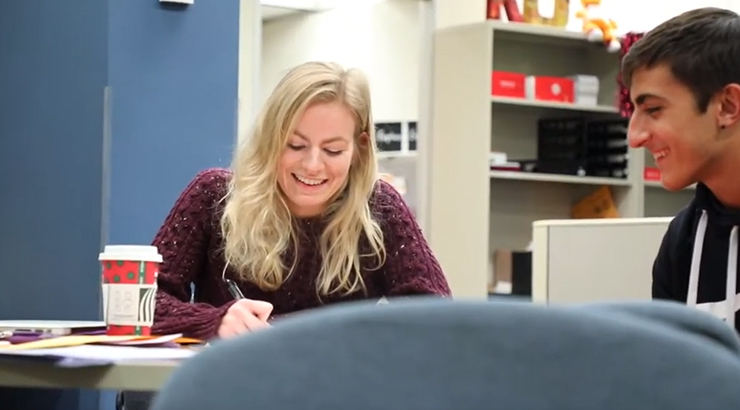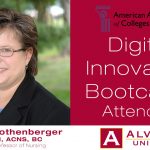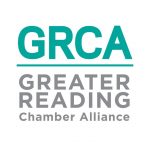KUTZTOWN, PA – KUDOS, Kutztown University’s Dedication to Outstanding Service, focuses on university administrative offices and academic departments and the individuals within them, giving the campus community a look inside the working areas on campus.
This week, University Relations (UR) sat down with the Career Development Center to get an inside look at the dedicated individuals who engage with the local community to help students make important decisions about future career paths and prepare them for searching and applying for jobs.
UR: Would you introduce yourselves and tell us how long you’ve been with KU?
JH: My name is Jenelle Henry; I’m one of the assistant directors in the office. I’m in my fifth year at KU, but I also had the pleasure to be the graduate assistant here. Three years as a graduate student, I went away for a while and now I get to do what I love to do at KU.
CG: My name is Chad Ganley. I’m an assistant director in the Career Development Center and I’ve been at KU for about three years.
KG: I’m Kerri Gardi; I’m the director of the Career Development Center at Kutztown. I’ve been at KU for 23 years and I’ve been the director for 12 years. I was an assistant director here and I also worked in the Office of Residence Life and Housing.
JC: My name is Jeann Cengeri and I am the office manager. I’ve been with Kutztown almost 14 years. Previous to working in the Career Development Center, I worked at the McFarland Student Union and the Multicultural Center
UR: What is your office’s role and mission at the university?
JH: Our role is to help students find career paths. A career path can mean a lot of different things; for freshman students that could be their choice of major. Those are the ones I work with and the ones I love the most. It could mean helping students find a major, figuring out what they want to do, finding an internship and obviously, we help those who are getting ready to walk across the stage to find a job. We offer interviewing skills and job search skills. Our mission statement talks about our want to teach students on how to do these things because even when they are out in the field, they will not have the same job for years on end. Students need to have job search skills to then do it again throughout their lives.
CG: Our overall goal is to provide students the resources and opportunities for them to be successful in their job and internship search so by the time that they graduate from Kutztown, they have found meaningful employment.
KG: Our mission is to support students in their career development. We educate them to learn about themselves, major options, the world of work and support them with the process. It isn’t always a fun process looking for internships, job searches and graduate school options, so we are here to assist.
JC: I think the role of the Career Development Center is to prepare students for the future. They will need to search for jobs or internships, write resumes and cover letters. We help prepare them in those areas that they will need to obtain jobs and careers.
UR: Can you explain your office’s staff make-up and responsibilities?
JH: Kerri Gardi, our director, oversees everything in the office. There are two assistant directors, myself and Chad Ganley. My role is more in choice or change of major – students who are just unsure if the major they chose is really for them. Chad jumps in from that point, going forward with internships and jobs. We have graduate assistants who help with events, presentations and workshops. We have career assistants who review resumes in the afternoons and a host of undergraduate students who work at our front desk. I have an education background, Chad has more of a business background, so no matter what you need we can find out who is best suited to help you.
CG: My role is more on employer-relations, so I help with our internships and job fairs and any kind of programs. We have the Mock-Interview Mania program. We have industry panels. We have so many things we do with employers to get them on campus, interviewing, recruiting KU students – that’s the employer-relations side. We have a couple graduate assistants, career assistants and career peers to help with the documents that students need.
KG: We also have three graduate assistants: Eric, Allison and Samantha. Sam comes from our College of Business and specifically supports College of Business students. We have a makeup of graduate students who work as student-workers doing resume and cover-letter reviews and mock interview reviews. We have a team of undergraduate students called ‘career peers’ who help students and employers when they come through the door.
JC: I supervise student workers, oversee the Career Closet, manage the office’s paperwork and room reservations, schedule appointments and answer the phone. I am usually the first person that everyone sees or the first person that they speak to when calling.
UR: How does your office serve students and the campus community?
JH: The campus community and surrounding communities are our employer partners. They bring jobs to the campus, but also are volunteers for us. They send mock-interviewers every semester so students can get critical feedback. They come to campus for job fairs. They come to campus for informational sessions. They are real interviewers giving real feedback, which is not something students hear when they go for actual interviews. The employers want to give them that feedback. The campus community is all about our students. We are all about our students and employer partners.
CG: We do employer site-visits. We rent busses and will shuttle students back and forth for group tours, meeting human resources and hearing presentations about related companies and even networking opportunities. Within the last year, we’ve been to Google, the Philadelphia Eagles, ArtsQuest, Olympus, the list goes on. Those are just a handful of really cool opportunities that our students got to experience. We are always looking to add those on. If students are really interested in going somewhere, they can let us know and we will organize those trips for you. Many times, we announce these through email, but often it’s partnered with faculty or a specific class or major. However, when there are open seats, contact me for open seats and we will fill them up.
KG: We often partner with employers, faculty and administrators on campus. For example, with faculty we incorporate class visits into their courses, offer workshops and seminars, take students on employer site visits. Really just helping students with the career process and if we can have a faculty member through a course, that’s even better, because students are really busy. If it’s part of a course, they’re more apt to get involved and start thinking about themselves and forming a career development plan. It’s always a good thing when they can get class credit for being here.
JC: We serve students by offering clothing through the Career Closet, which is brand-new this year. We help them obtain professional attire for interviews or events. We host four fairs a year – two internship/job fairs, a graduate school fair and a job fair for educators. We offer cover letter and resume reviews as well as mock interviews, both in-person and online. The staff does counseling for both major and career choices. We host two senior etiquette dinners per year. The etiquette dinner is held in the fall and spring for seniors. Employers are invited to this and the students have the opportunity to network with those employers during appetizers. Employers are then seated at each table with the students so they can continue conversing while dinner is served and rules for proper etiquette are discussed. Our next etiquette event is scheduled for Tuesday, Feb. 18. Students must pre-register and it is free to the students, unless they do not show up.
UR: What are the points of pride in your office?
JH: A huge point of pride in our center, for me, is our certificate program . We offer two certificates. The first is for freshmen and sophomores that focuses on career exploration, getting them through the choice of major and how to design a career path up to internship and job search. The second is an internship certificate for juniors and seniors. That’s for internships searching and job searching, so preparing those students to walk across the stage with job-search skills and interview practice. Those are my babies; I handle those here in the office.
CG: I love to talk about our employer engagement. We had more than 200 employers on campus within the last year, coming to internship and job fairs, coming to Mock-Interview Mania, getting information tables and networking events. Our students have the opportunity to meet, network and potentially get recruited by more than 200 employers just being on campus here at KU. They don’t have to drive or fly anywhere; those employers are coming to us with interest in our students.
KG: Our partnerships with faculty is such a big point of pride. We work with so many from all different departments consistently, every semester.
JC: I am happy with the interaction that we have with students. We go into classrooms, present workshops, host fairs and offer the certificates for professional development. Students come in as freshman and don’t know about the certificate programs or they don’t know how to write a resume. We help them throughout their four years and see the growth and change in them. When they come back and tell us, “I got an interview,” or, “I got the job,” we are so excited for the students. It makes me proud to interact with them and see them grow and develop their skills.
UR: What would you like people to know about your office that they may not know already?
JH: One thing we need our students to know is that we are approachable. We are not a stuffy office; we’re here to help! We have the same genuine want to see students succeed that all personnel on this campus do. Just today, a student asked me if they needed to dress up to come back for his appointment. No; come as you are! For the faculty, I want them to know they can partner with us. We are here to support them too within their classes. We can find ways to incorporate skills into their syllabus or relevant experiences or explorations. They can recommend their students to our office.
CG: Our new platform, Handshake, is for our students. It has more than 400,000 employers they can apply for internships, jobs, go to other events, etc. Because it’s so new, many of our students aren’t aware these opportunities are currently available. We get 30 to 40 new job listings per day – the students just have to look.
KG: We are really proud of the fact that close to 65-70% of students are engaged with the Career Center every semester. That’s because of our partnerships with faculty, staff and employers. Students are coming in for career counseling appointments, they’re going to our events and workshops, like career fairs and employer site-visits, they’re part of our certificate programs. They’re coming to visit the Career Closet. It’s a significant number and it’s because of our partnerships. Our office coordinates the First Destination Career Outcome Survey, so we know where students are at graduation and then three and six months out.
JC: For one, I think we had more than 75 workshops this past semester. That does not include the classroom or club presentations. I don’t think people realize how many workshops we do and how many collaborations we have with faculty, First-Year Seminar students, TRIO, CASA, Honors and Senior Seminar students. We work with a variety of departments, but there are others we would like to collaborate with as well. We would like to do more for our Fine Arts students, for example. I think people don’t realize how many workshops we offer during the semester and all the resources that we have. I would like more people to know about the permanent Career Closet we started for the students.
UR: How can the campus community learn more or become involved with your office?
JH: We always like the face-to-face conversation with students. We do some outreach, going to faculty office hours and getting in front of them. People can always learn stuff online, but we are here, we are in the community. No one wants to read emails! Come talk to us, find out what we can do or you. When students, employers, faculty find out what we can do for them, how we can help and find value in the cooperation.
CG: We can always use more help with Mock-Interview Mania. It brings on community employers who have three to five years of experience. They can contact me on a volunteer basis and I will give them a time slot. We bring roughly 30 to 40 employer recruiters to have mock-interviews with our students. It gives the students the experience of a real interview, but with actual feedback, which you don’t get in normal interviews. Faculty can also reach out to partner with us for those trips to business locations or students can ask about any of the upcoming site-visits.
KG: One easy way is to donate or visit the Career Closet, which we just opened last spring. We are using an interview space for a closet of professional clothing. Students can stop by our office any time between 8 a.m. to 4 p.m., no appointment and say, “I’d like to go to the Career Closet.” They’ll walk down with a staff member and they can do some shopping and hopefully find clothing that fits them and they like. We have a suggested donation of $2 per piece and all money goes to the TriO SSSP Scholarship Fund, so it’s a really great opportunity both for those looking to donate clothing or students looking for affordable professional clothing. We’ve had more than 80 students who have gotten clothing since we opened. Faculty, staff, alumni and even community members have been donating. We will continue to need donations as more and more students find out about the C areer Closet. We are most in need of smaller sizes and larger sizes. People can also donate gift cards so we can buy the sizes we need during sales. Anyone willing to donate can walk-in any time and drop it off in a garbage bag! If they need assistance we will walk out to the car and help them get it out of the car.
UR: What’s your favorite thing about your KU experience?
JH: My favorite thing about my KU experience would have to be now, as an employee. I think now, what I value the most is watching a student from specifically finding a lightbulb moment. Whether it’s finding the right major or just having an idea of what might be right for them. I can really see the light shine on their face and I can say, “you really smiled so much more during this conversation about this major rather than any other majors.” So, I really find value in the “that’s it!” lightbulb moment. They need to figure it out on their own. I can’t hand them a piece of paper with their major. Whatever the conclusion is, I get to celebrate that with them.
CG: The most gratifying thing I get in my position is when a student that we’ve been seeing at our events, coming to our office, getting an internship or job and then coming back to us in three months, six months, a year and telling us, “I’m so glad I came to this. It helped me professionally, made me more confident and then I got that job!”
JC: I’ve been here for almost 14 years. I started out at the Multicultural Center as their office manager and helping with programming and then I went to the Student Union. I’ve been here at the Career Center for a year and a half now. I really enjoy the student interaction. When I was in the Multicultural Center, I had freshman who are graduating now or have graduated; it always makes me happy to see them. When they were students, you had to be their supervisor or mentor them, but it makes you feel good to be a positive influence. One student even called me “mom” and before he graduated, gave me a keychain with “mom” on it. I still have it to this day. I really enjoy seeing the success in the students as they graduate and move on to their next phase of their journey
UR: What does “It’s Good to be Golden” mean to you?
JH: Being a graduate student from the past to now, I feel like there is a greater sense of university pride. We had more students here when I was a graduate student, however, I feel like the students here now want to wear their Kutztown sweatshirts around campus. They want people to know that they are a Kutztown student. I think “it’s good to be golden” just means, to them, I’m here and I want to be here.
KG: “It’s good to be golden” is about a sense of pride in KU and its students. It’s so wonderful to think about all the students we’ve connected with over the years and where they start out as a freshman or as a graduate or transfer student and how they grow and develop. They’re here because of KU and what it affords students, if they take advantage of it. Hopefully they do.
JC: I think it means we are part of a community that’s also like a family. I’ve gone through things personally and professionally and have found there is such a solid support system here at KU. There are so many giving and caring people who work here. There’s always someone doing a collection to benefit others and you will see so many of the staff and faculty being so generous. It’s a golden community spirit. We are all different, but we all have a goal for the success of the students and the support of co-workers. There are many here on campus that I can call friends and that is what it means to say “it is good to be golden.”



